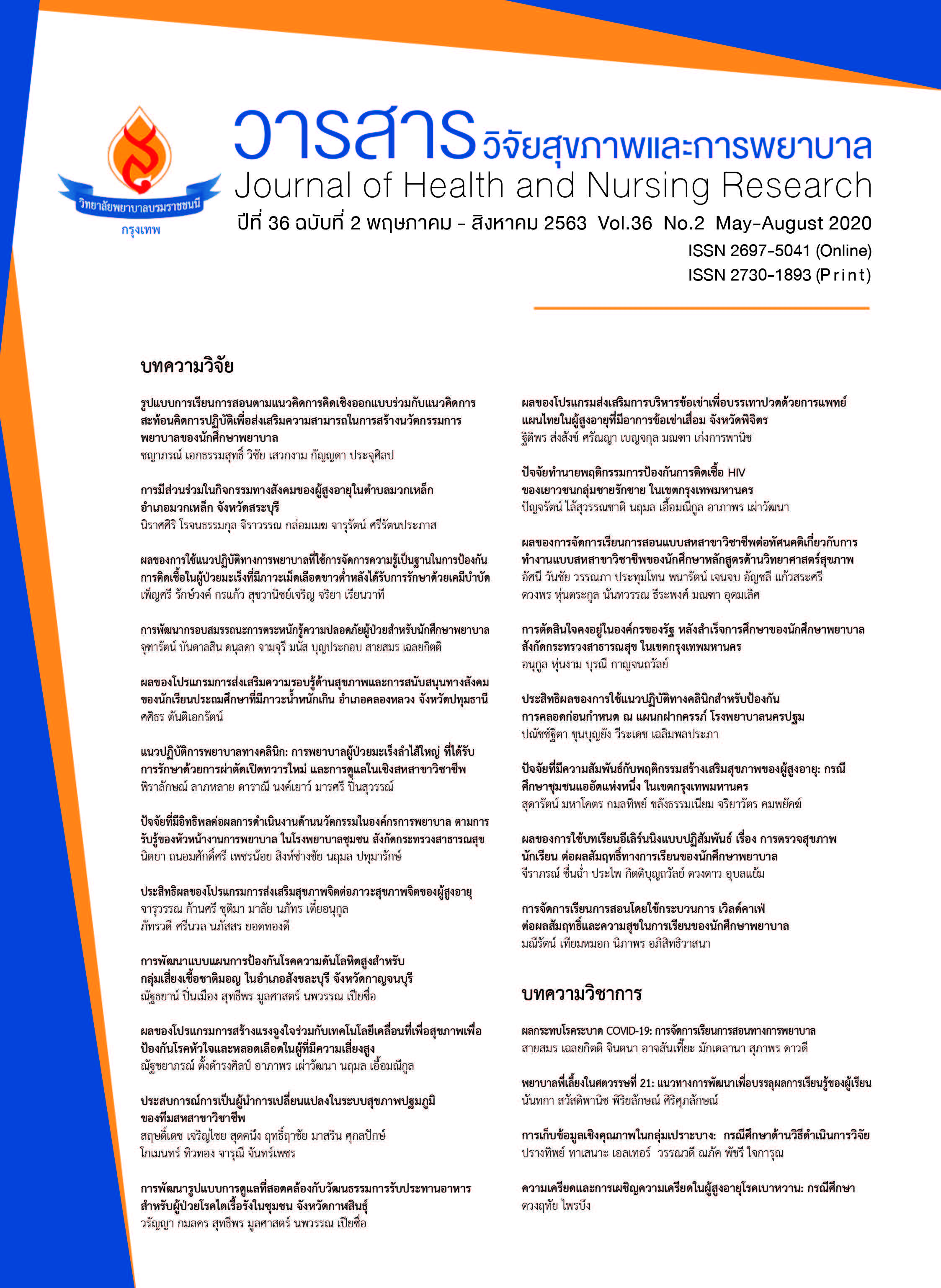ผลของการใช้แนวปฏิบัติทางการพยาบาลที่ใช้การจัดการความรู้เป็นฐานในการป้องกันการติดเชื้อในผู้ป่วยมะเร็งที่มีภาวะเม็ดเลือดขาวต่ำหลังได้รับการรักษาด้วยเคมีบำบัด
คำสำคัญ:
แนวปฏิบัติการพยาบาล, การจัดการความรู้, ภาวะเม็ดเลือดขาวต่ำ, เคมีบำบัด, ทฤษฎีอาการไม่พึงประสงค์บทคัดย่อ
วิจัยนี้มีวัตถุประสงค์ 1.พัฒนาแนวปฏิบัติทางการพยาบาลในการป้องกันการติดเชื้อในผู้ป่วยมะเร็งที่มีภาวะเม็ดเลือดขาวต่ำหลังได้รับการรักษาด้วยเคมีบำบัดผ่านกระบวนการจัดการความรู้ 2.ศึกษาผลของการใช้แนวปฏิบัติทางการพยาบาลฯต่อผลลัพธ์ในการดูแลในผู้ป่วยมะเร็งที่ได้รับเคมีบำบัด ได้แก่ อัตราการติดเชื้อในภาวะเม็ดเลือดขาวชนิดนิวโตรฟิลต่ำ อัตราการเกิดภาวะติดเชื้อในกระแสเลือด อัตราการช็อคจากการติดเชื้อ อัตราการเสียชีวิต การปฏิบัติตามแนวปฏิบัติทางการพยาบาลฯ และความพึงพอใจของบุคลากรวิจัยนี้เป็นวิจัยเชิงปฏิบัติการศึกษาในกลุ่มงานการพยาบาลผู้ป่วยมะเร็ง ระหว่าง มิถุนายน พ.ศ. 2560-พฤษภาคม พ.ศ. 2561 ผู้ให้ข้อมูลประกอบด้วย พยาบาลวิชาชีพ 32 คน และ ผู้ป่วยมะเร็ง 30 คน เก็บข้อมูลด้วย การสนทนาตามธรรมชาติ การสังเกตแบบมีส่วนร่วม และไม่มีส่วนร่วม แบบสอบถาม แบบบันทึกกิจกรรมการจัดการความรู้และการวิเคราะห์เอกสาร วิเคราะห์ข้อมูลเชิงปริมาณด้วยสถิติเชิงพรรณนา และข้อมูลเชิงคุณภาพด้วยการวิเคราะห์เนื้อหา แนวปฏิบัติทางการพยาบาลฯถูกพัฒนาขึ้นในกระบวนการวิจัยผ่านการจัดการความรู้บนพื้นฐานทฤษฎีอาการไม่พึงประสงค์ ประกอบด้วย 4 ประเด็นหลัก คือ การประเมินกลุ่มเสี่ยงเพื่อวางแผนการดูแล การพยาบาลที่สอดคล้องตามระดับความเสี่ยง การวางแผนจำหน่ายที่สอดคล้องตามระดับความเสี่ยง และการติดตามอาการหลังจำหน่าย เมื่อนำแนวปฏิบัติทางการพยาบาลฯไปใช้ พบว่า พยาบาลสามารถปฏิบัติตามแนวปฏิบัติฯได้ในภาพรวมร้อยละ 100.00 พยาบาลส่วนใหญ่เห็นด้วยกับการนำแนวปฏิบัติทางการพยาบาลฯไปใช้ในระดับมาก อุบัติการณ์การเกิด
ภาวะติดเชื้อพบร้อยละ 3.30 ไม่พบการเกิดภาวะติดเชื้อในกระแสเลือด การช็อคจากการติดเชื้อ และการเสียชีวิต สรุปและข้อเสนอแนะ แนวปฏิบัติทางการพยาบาลฯนี้มีแนวโน้มก่อให้เกิดผลลัพธ์ที่ดีและเกิดการดูแลผู้ป่วยที่ต่อเนื่อง ดังนั้นควรมีการนำแนวปฏิบัติทางการพยาบาลนี้ไปใช้จริงในบริบทการดูแลผู้ป่วย
Downloads
เอกสารอ้างอิง
2 World cancer research fund international. Worldwide cancer data: global cancer statistics for the most common cancers. [cited 2019 Feb 10]. Available from: https://www.wcrf.org/ dietandcancer/cancer-trends/worldwide-cancer-data.
3. Stewart B, Chistopher PW. Risting burden of cancer: world cancer report 2014. [cited 2018 Dec 10]. Available from: http://www.ias.org.uk/
4. Imsamran W, Pattatang A, Supaattagorn P, Chiawiriyabunya I, Namthaisong K, Wongsena M, et al, editors. Cancer in Thailand. Vol. IX, 2013-2015. Bangkok: New Thammada Press; 2018.
5. American cancer society. Facts & Figures 2018: Rate of deaths from cancer continues decline. [cited 2020 March 20]. Available from: https://www.cancer.org/latest-news/facts-andfigures-2018-rate-of-deaths-from-cancer-continues-decline.html
6. Gordon M.S. Myelosuppression. In: Kirkwood JM, Lotze MT, Yasko JM, Editors. Current cancer therapeutics 4th ed. London: Current medicine group; 2019. P. 374-81.
7. Yasunori H, Mari K, Takeshi F, Tomoyuki I, Tomoyo Y, Toshiyuki S. Chemotherapy-induced neutropenia and febrile neutropenia in patients with gynecologic malignancy. Anti-Cancer Drugs 2015;26(10):1054-60.
8. Warnock C. Neutropenic sepsis: prevention, identification and treatment. Nursing standard 2016;30(35):51-60.
9. Livingston PM, Craike M, Slavinb M. Clinical and economic burden of emergency department presentations for neutropenia following outpatient chemotherapy for cancer in victoria, australia. Oncologist 2012;17(7):998–1004.
10. Cancer network. infectious complications. [cited 2017 Oct 4]. Available from: http://www.cancernetwork.com/ cancer-management/infectious-complications
11. Strojnik K, Mahkovic-Hergouth K, Novakovic JB, Seruga B. Outcome of severe infections in a febrile neutropenic cancer patients. Radiol Oncol 2016;50(4):442–48.
12. Zembower TR. Epidemiology of infections in cancer patients. Cancer Treatment and Research 2014;161:43-89.
13. Freifeld AG, Bow EJ, Sepkowitz KA, Boeckh MJ, Ito JI, Mullen CA, Wingard JR. Infectious diseases society of America: clinical practice guideline for the use of antimicrobial agents in neutropenic patients with cancer. [cited 2017 Oct 4]. Available from: https://www.idsociety.org/ uploadedFiles/
IDSA/Guidelines-Patient_Care/PDF_Library/FN.pdf
14. Dolan S, Crombez P, Munoz M. Neutropenia management with granulocyte colony stimulating factor: from guidelines to nursing practice protocols. Eur J Oncol NursCancer 2005; S14-23.
15. Wang XJ, Wong CM, Chan A. Psychometric properties of the functional assessment of cancer therapy-neutropenia in Asian cancer patients with chemotherapy-induced neutropenia. J Pain Symptom Manage 2016; 52(3): 428-36.
16. Khammarnia M, Shahsavani F, Shahrakipour M, Barfar E. Relationship between knowledge management and quality of working life in nursing staff of zahedan teaching hospitals, 2014. Health Scope 2015;4(1):e22696.
17. Rocha FSB, NagliateI P, FurlanI CEB, JrII KR, Trevizan MA, Mendes IAC. Knowledge management in health: a systematic literature review. [cited 2017 Oct 4]. Available from: http://dx.doi.org/10.1590/S0104-11692012000200024
18. Nonaka I, Takeuchi H. The knowledge creating company: how Japanese companies create the dynamics of innovation. New York: Oxford University Press; 1995.
19. Sanprasarn P. Jamsomboon K. Knowledge management in cardiac nursing: quality Improvement. Thai Journal of Cardio-thoracic Nursing 2013;24(1):84-95. (in Thai)
20. Lenz ER, Pugh LC, Milligan RA, Gift A, Suppe F. The middle-range theory of unpleasant symptoms: an update. Advances in Nursing Science 1997;19:14-27.
21. Kim HS, Oh EG, Lee H, Kim SH, Kim HK. Predictors of symptom experience in Korean patients with cancer undergoing chemotherapy. Eur J Oncol Nurs 2015;19(6):644-53.
22. Schelenz S, Giles D, Abdallah S. Epidemiology, management and economic impact of febrile neutropenia in oncology patients receiving routine care at a regional UK cancer center. Annals of Oncology 2012;23(7):1889–93.
23. Chaiyawong N. The development of a clinical nursing practice guideline for prevention of infection in chemotherapy induced neutropenic cancer patients at ward 5e, Srinagarind hospital. [Master thesis] Khon Kaen: Khon Kaen University; 2014. (in Thai).
24. Chamsingkam S. Tongue-tie care system for promotes breast feeding at Maharat Nakhon Ratchasima Hospital Journal of Health Science 2015;24:420-29. (in Thai).
25. Rukwong P, Somdee P, Sukwanichchareon K. Effect of knowledge management on caring outcomes of cancer patient receiving chemotherapy Journal Of Nurses’ Association Of Thailand, North-Eastern Division 2013;31(4):152-87. (in Thai).
26. Fadhillah H, Muhammad Hadi M. Effect of nurse performance in patient safety target based on knowledge management: SECI on quality of nursing services. IJINNA 2018;1(1):1-12.
27. Kamalanathan NA, Eardley A, Chibelushi C, Collins T. Improving the patient discharge planning process through knowledge management by using the internet of things. Advances in Internet of Things 2013;3(2A):16-26.
28. Simon L.The relationship between knowledge management tools and interprofessional healthcare team decision making. [doctoral thesis]. Minnesota: Walden University; 2016.
ดาวน์โหลด
เผยแพร่แล้ว
รูปแบบการอ้างอิง
ฉบับ
ประเภทบทความ
สัญญาอนุญาต
บทความที่ได้รับการตีพิมพ์ เป็นลิขสิทธิ์ของวารสารวิจัยสุขภาพและการพยาบาล (วิทยาลัยพยาบาลบรมราชชนนี กรุงเทพ) ไม่สามารถนำไปตีพิมพ์ซ้ำในวารสารฉบับอื่น


















